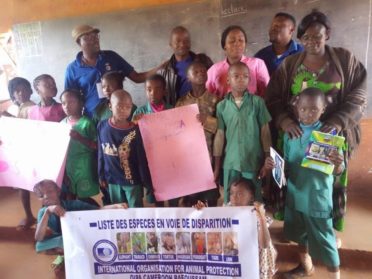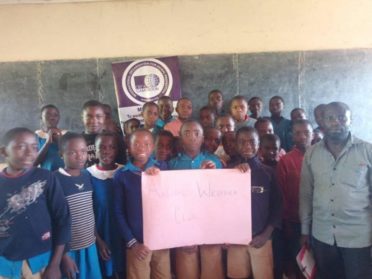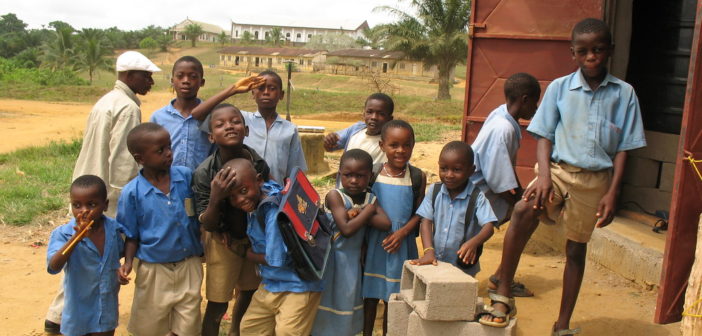 An important part of the International Organization for Animal Protection (OIPA) Cameroon’s work is using education to raise awareness on animal issues among children, especially from an early age. The lessons and talks given in primary schools handle a wide range of topics, including understanding animals as sentient beings and the importance of the humane treatment of animals; basic care for pets, pet health, pet behavior and needs; an appreciation for the important roles animals play in human lives; and the contribution of each member of a community to influence the welfare of animals.
An important part of the International Organization for Animal Protection (OIPA) Cameroon’s work is using education to raise awareness on animal issues among children, especially from an early age. The lessons and talks given in primary schools handle a wide range of topics, including understanding animals as sentient beings and the importance of the humane treatment of animals; basic care for pets, pet health, pet behavior and needs; an appreciation for the important roles animals play in human lives; and the contribution of each member of a community to influence the welfare of animals.
Here in the central African country of Cameroon, animals are numerous in our communities. It is vital that we eradicate harmful myths and inaccuracies about animals and help people become caring and compassionate towards animals. We also hope to promote an understanding of the psychosocial impacts of human-animal relationships, and how these benefits can improve both human and animal health and welfare around the world.
 Recently, in collaboration with the government, OIPA Cameroon conducted an education outreach program on animal welfare and environmental protection in 14 government-run primary schools. Lessons were designed to be interactive and were crafted and carried out by trained volunteers and animal welfare professionals. These programs educated up to 87 pupils per school, aged between 6 and 15 years old.
Recently, in collaboration with the government, OIPA Cameroon conducted an education outreach program on animal welfare and environmental protection in 14 government-run primary schools. Lessons were designed to be interactive and were crafted and carried out by trained volunteers and animal welfare professionals. These programs educated up to 87 pupils per school, aged between 6 and 15 years old.
To ensure sustainable change, animal welfare clubs were created in the visited schools. The club are made up of 10-15 members with a leader and an assistant, and their activities include creating poems, sketches, debates, songs, and drawings about animals and the environment and presenting them in front of the entire school. An inter-club competition between the different schools will also ensure the momentum for change is maintained.
A mobile sensitization team was also deployed to enlighten animal owners within the community on the importance of the “five freedoms” for animals, spaying and neutering pets to decrease stray populations, and to generally promote respect and kindness to all living creatures. Focus group talks were also carried out in the market places and public meeting areas, targeting as large an audience as possible. These talks were directed to adults, especially animal owners, focusing on dissuading them from all forms of animal cruelty, including killing animals for meat. Reactions from locals to the information presented were diverse.
mobile sensitization team was also deployed to enlighten animal owners within the community on the importance of the “five freedoms” for animals, spaying and neutering pets to decrease stray populations, and to generally promote respect and kindness to all living creatures. Focus group talks were also carried out in the market places and public meeting areas, targeting as large an audience as possible. These talks were directed to adults, especially animal owners, focusing on dissuading them from all forms of animal cruelty, including killing animals for meat. Reactions from locals to the information presented were diverse.
 To put into practice the lessons taught in the classrooms and on the field, a free treatment and vaccination program for pets was introduced at the end of the program. The goal was to treat, spay and neuter over 50 pets and 20 stray animals within the community and demonstrate to the community the paybacks of enhanced animal health and welfare. A total of 31 animals (7 cats, 21 pet dogs and 3 stray dogs) were treated. We observed that most of the dogs were malnourished and had wounds on their skin. Most of them were unvaccinated against diseases such as parvovirus, distemper and rabies. Common parasites like round worm, tape worms, fleas and ticks affected most pets, which serves as an indication of poor care for pets within the community. It was also clear that most dogs had been beaten, ill-treated and left by themselves to look for their own food.
To put into practice the lessons taught in the classrooms and on the field, a free treatment and vaccination program for pets was introduced at the end of the program. The goal was to treat, spay and neuter over 50 pets and 20 stray animals within the community and demonstrate to the community the paybacks of enhanced animal health and welfare. A total of 31 animals (7 cats, 21 pet dogs and 3 stray dogs) were treated. We observed that most of the dogs were malnourished and had wounds on their skin. Most of them were unvaccinated against diseases such as parvovirus, distemper and rabies. Common parasites like round worm, tape worms, fleas and ticks affected most pets, which serves as an indication of poor care for pets within the community. It was also clear that most dogs had been beaten, ill-treated and left by themselves to look for their own food.
We are hopeful about the impact we will have on the animals in our communities through these education programs, especially as the children we have taught grow up and become adults. It may be discouraging at times to see the current state of many of our animals, but we believe we are doing the work today to change tomorrow.
Featured image: Schoolchildren in Cameroon. Image credit James Emery, CC BY-SA 3.0. All other images in this story via OIPA Cameroon.





